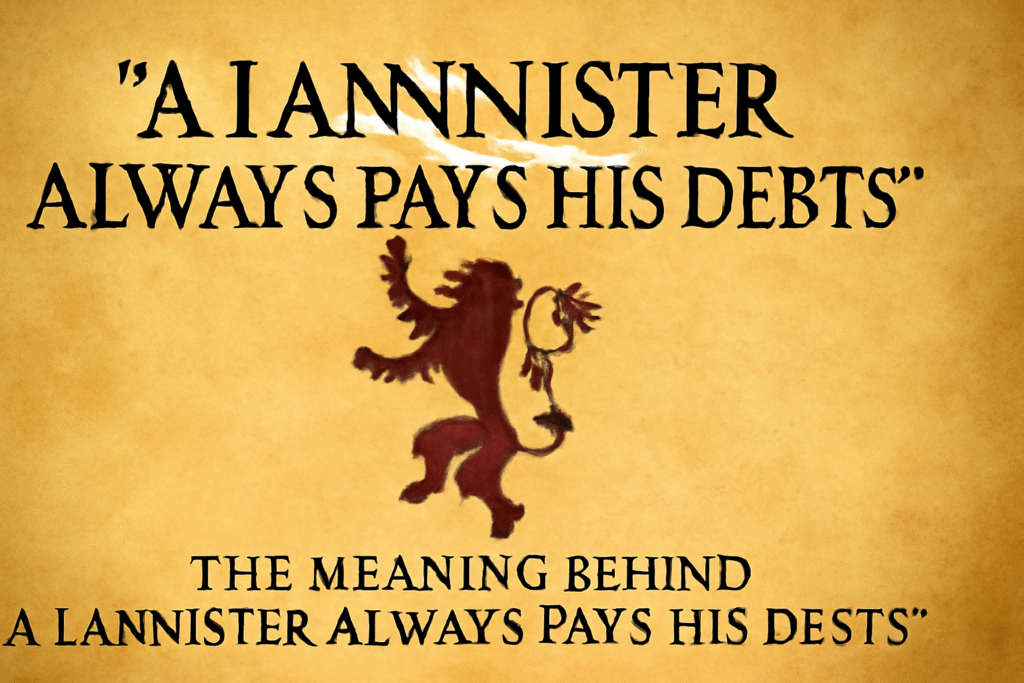
Understanding the Meaning Behind 'A Lannister Always Pays His Debts' and Its Significance in Game of Thrones
If you’re a fan of Game of Thrones, you’ve undoubtedly heard the iconic phrase, “A Lannister always pays his debts.” But what does it truly mean beyond just a catchphrase? 
In this article, we’ll dive into the meaning behind “A Lannister always pays his debts” and explore why this phrase became such a pivotal part of the series. We’ll uncover how it goes beyond monetary transactions, representing power, loyalty, and honor within the Lannister family.
By the end of this article, you’ll not only understand the phrase’s significance in Game of Thrones but also see how it can teach valuable lessons about reputation, trust, and power in the real world. Whether you’re a long-time fan of the show or new to the Lannisters’ world, this exploration will give you fresh insights that might just change how you think about debts—both literal and metaphorical. Let’s get started!

Table of Contents
Toggle1. What Does “A Lannister Always Pays His Debts” Really Mean?
At first glance, the phrase “A Lannister always pays his debts” might seem like just a catchy saying from Game of Thrones. However, its meaning runs much deeper than a mere promise to settle accounts. Let’s break it down and explore what it truly signifies.
Literal Meaning: The Debt of Honor
On the surface, the phrase refers to the Lannister family’s commitment to repaying any financial or personal debts. In the world of Westeros, where loyalty and wealth are paramount, the Lannisters are renowned for their riches, and they pride themselves on fulfilling promises—especially when it comes to money. When someone says, “A Lannister always pays his debts,” it’s a statement of integrity: you can count on them to honor their word, no matter the cost.
Symbolizing Power and Reputation
But the phrase isn’t just about money. It’s a symbol of the Lannisters’ power and reputation. The family’s wealth gives them the ability to repay any debt, but it also underlines their dominance over others. In the world of Game of Thrones, power is often tied to one’s ability to settle scores and manage relationships—whether those are business deals or personal vendettas.
Think of it like this: when the Lannisters promise to pay, they’re not just talking about money—they’re asserting their control, strengthening their influence, and making sure no one questions their ability to act.
Loyalty and Trust
Beyond the financial angle, the phrase also emphasizes loyalty. The Lannisters’ willingness to pay their debts reflects their commitment to family and allies. In a world where trust can be fleeting, knowing that someone “always pays their debts” creates a sense of dependability. It shows that the Lannisters are reliable, no matter how complex or difficult the situation.
Beyond Financial Debt: A Metaphor for Vengeance
In a deeper sense, the phrase also acts as a metaphor for repaying wrongdoings or avenging grievances. For the Lannisters, debts aren’t just monetary; they often refer to personal or political actions. If someone wrongs them, the phrase signals that they will take action—often with devastating consequences—to right the wrong, whether through retaliation or punishment.
Key Takeaway: More Than Just Money
So, what does it all mean? “A Lannister always pays his debts” is a phrase that encompasses honor, power, loyalty, and reputation. It’s not just about financial obligations—it’s about the Lannister family’s unshakeable belief in maintaining control, settling scores, and ensuring their legacy remains unchallenged.
By understanding this phrase, we gain insight into the Lannisters’ mindset. It’s a code they live by, shaping their actions and decisions throughout the series. And while it’s a concept rooted in the world of Westeros, it carries valuable lessons that can be applied to real-life situations, whether in business, personal relationships, or in understanding the true meaning of integrity and power.

2. The Origins of the Phrase in Game of Thrones
The phrase “A Lannister always pays his debts” is closely tied to the very essence of the Lannister family in Game of Thrones. But where did it originate, and why does it hold such power in the narrative?
First Introduction: Tyrion Lannister Sets the Tone
The phrase is introduced early in the Game of Thrones series, specifically during Season 1, when Tyrion Lannister says it to emphasize his family’s commitment to honoring their obligations. It is used as a promise, not just about financial debts but also about the importance of the Lannister family’s word and loyalty. Tyrion, the clever and often underestimated member of the family, first uses the phrase to underline his wit and strategic approach to dealing with problems—whether they involve money or personal conflicts.
This marks the beginning of the phrase’s evolution, from a simple monetary statement to a symbol of the family’s broader political and personal values.
The Lannister Family Code: Tywin’s Influence
While Tyrion popularized the phrase, it’s really Tywin Lannister, the powerful patriarch of the family, who reinforces its significance. Tywin is the embodiment of ruthlessness and control, and his actions throughout the series reflect the very idea of “paying debts” as a way to maintain power and influence.
In Season 2, Tywin’s emphasis on fulfilling debts is shown in several key moments. His ability to settle scores, whether through political maneuvering or military strength, shows the true scope of what the phrase represents. It’s not just about finances—it’s about maintaining the family’s honor and ensuring their dominance over rivals.
A Family Motto: Deeper Than Financial Transactions
As the series progresses, the phrase becomes more than just a catchphrase. It turns into a family motto and is repeated by other characters, solidifying its importance in the Lannister identity. The phrase is tied to loyalty, reputation, and the unyielding nature of the family’s commitment to their actions—whether good or bad. For the Lannisters, paying their debts isn’t simply about money; it’s about ensuring that no wrong goes unpunished and no promise is broken.
Key Moments That Define the Phrase
Throughout the series, the phrase appears at critical junctures, cementing its place in the Lannister narrative. From Tyrion’s clever political moves to Tywin’s ruthless tactics, the idea of always repaying debts shapes how the family interacts with both allies and enemies. Whether it’s Tyrion compensating a loyal servant or Tywin using wealth and power to settle an old score, these moments showcase how the phrase encapsulates the family’s core values.
The Legacy of the Phrase
By the end of the series, the phrase has become synonymous with the Lannister family’s legacy. It’s not just about money or even honor anymore—it represents their dominance in Westeros. For viewers, the phrase serves as a reminder of the Lannisters’ rise to power and their complex relationships with those around them.
In summary, “A Lannister always pays his debts” began as a simple promise about financial repayment but evolved into a symbol of family pride, political influence, and loyalty. Its origin story is intertwined with the characters of Tyrion and Tywin Lannister, reflecting the family’s enduring commitment to maintaining control over their fate.

3. The Deeper Meaning: Exploring Loyalty, Power, and Honor
While “A Lannister always pays his debts” might first appear to be about financial obligations, its true depth goes far beyond that. This iconic phrase represents key themes in Game of Thrones: loyalty, power, and honor. Let’s take a closer look at how these elements shape the meaning of the phrase.
Loyalty: The Foundation of the Lannister Legacy
At its core, the phrase speaks to the loyalty that defines the Lannister family. For the Lannisters, paying a debt isn’t just about financial repayment—it’s about showing unwavering allegiance to family, allies, and even personal interests.
- Family Loyalty: The Lannisters’ loyalty to each other is central to their success. From Tywin’s protective leadership to Tyrion’s loyalty to his family (even when they don’t always deserve it), the idea of “paying debts” reflects how deeply family ties run in Westeros.
- Loyalty to Allies: The phrase also extends to the way the Lannisters handle their political alliances. For them, honoring promises is essential in keeping relationships intact and ensuring they have the backing of powerful figures.
Power: Debt as a Tool of Control
In Game of Thrones, power is often wielded through debts—both financial and personal. When the Lannisters say they “pay their debts,” it’s not just a statement of integrity; it’s a strategic move to maintain dominance.
- Financial Power: The Lannisters, being one of the wealthiest families in Westeros, use their wealth as a tool for both business and political leverage. Paying a debt (or extracting repayment) gives them control over others, allowing them to manipulate situations to their advantage.
- Political Power: The family also uses their reputation for always settling debts to maintain influence. Whether it’s securing military alliances or coercing enemies, paying debts ensures that the Lannisters keep their enemies on edge and their allies firmly in line.
Honor: The Code of the Lannisters
Honor plays a crucial role in the Lannister family’s identity. When they vow to pay their debts, it’s not just about keeping their word—it’s about maintaining their honor in a world where betrayal is common, and loyalty is scarce.
- Personal Honor: Tywin Lannister, in particular, exemplifies this commitment to honor. His actions often involve ensuring that his family’s reputation remains untarnished. Whether through financial means or vengeance, the Lannisters’ honor is linked to the notion that they will always come through on their promises.
- Political Honor: On a larger scale, the Lannisters’ ability to repay debts and maintain loyalty plays a central role in their political stability. The world of Westeros is built on power plays, and honor is a vital tool for navigating this cutthroat environment.
Key Takeaway: A Unified Philosophy
The deeper meaning behind “A Lannister always pays his debts” encapsulates the philosophy of the Lannister family: loyalty, power, and honor. These elements are inextricably tied to their success, shaping the way they navigate relationships and power struggles. For the Lannisters, repaying debts isn’t just about money—it’s a manifestation of their values and worldview.
Understanding this multi-layered meaning allows us to appreciate the complex dynamics within the Lannister family and the way they use debts to maintain their dominance over Westeros. This phrase ultimately represents more than a code of conduct—it’s a tool for empire-building.

4. Practical Application: How “A Lannister Always Pays His Debts” Relates to Real Life
While Game of Thrones may seem like a world of fantasy, the principles behind the phrase “A Lannister always pays his debts” can offer valuable lessons in real life. Whether you’re navigating business, personal relationships, or building your reputation, this Lannister motto holds some practical truths that are worth considering.
Building Trust in Business and Personal Relationships
In any relationship—whether professional or personal—trust is key. The Lannisters’ commitment to paying their debts demonstrates the importance of keeping promises and honoring obligations.
- In Business: When a company or individual consistently fulfills their commitments (whether it’s repaying loans, meeting deadlines, or honoring contracts), they build a reliable reputation. This reputation can open doors for future partnerships, investments, and opportunities. When clients or partners trust that you will pay your debts, it strengthens your business relationships and can set you apart from the competition.
- In Personal Relationships: The Lannisters’ adherence to loyalty and paying what’s owed teaches us that trust is foundational in personal connections. Whether it’s fulfilling promises to friends, family, or colleagues, staying true to your word ensures that relationships remain strong and lasting. Trustworthiness fosters a positive atmosphere where both parties feel valued.
Leveraging Power and Influence Responsibly
The Lannister family uses the concept of “paying debts” as a way to assert power and influence. But, in the real world, this power should be leveraged responsibly.
- In Negotiations: Much like the Lannisters use their wealth and reputation to control others, understanding how to use your resources wisely in negotiations can give you an edge. However, it’s important to balance power with fairness. Fulfilling your obligations and showing that you can be trusted in a deal is a way to solidify your influence without resorting to manipulation or coercion.
- In Leadership: Good leaders, like Tywin Lannister (though controversial in his methods), understand that power comes with the responsibility of treating others with respect. When you repay your debts (be it in financial, moral, or professional terms), it not only builds loyalty but also establishes your credibility as a leader others can depend on.
The Importance of Reputation and Honor
Reputation and honor are at the heart of the Lannisters’ motto. In real life, maintaining a strong reputation and acting honorably can have a profound impact on your career and personal life.
- Professional Integrity: Just as the Lannisters have a reputation for paying debts, maintaining integrity in your professional life can have lasting effects. Being known for honoring commitments, whether big or small, can help you advance in your career and gain the trust of others. Over time, this builds respect in your industry or community.
- Personal Honor: On a personal level, treating people with respect, keeping promises, and acting with integrity creates a foundation of honor. It can help you build long-lasting friendships and foster a sense of loyalty from those around you. When you fulfill your personal obligations, you show others that you can be trusted, just like the Lannisters’ motto promises.
Key Takeaways: Apply the Lannister Motto in Your Life
- Keep Your Word: Whether it’s business or personal, honoring your commitments strengthens trust and builds relationships.
- Leverage Power Responsibly: Use your resources, whether they’re financial or influence-based, to enhance your credibility and maintain fairness.
- Maintain Your Reputation: Just as the Lannisters value their reputation, cultivating a positive and honorable reputation is essential for long-term success.
By understanding how “A Lannister always pays his debts” applies in the real world, you can see that it’s not just about paying money—it’s about creating a life built on trust, power, and honor.

5. The Significance of the Phrase in the Larger Game of Thrones Narrative
The phrase “A Lannister always pays his debts” isn’t just a catchphrase—it plays a pivotal role throughout the Game of Thrones series, shaping key moments and character arcs. Let’s explore how this seemingly simple motto resonates through the larger narrative and why it’s more than just a line from the Lannister family.
A Symbol of the Lannister Family’s Identity
From the beginning of Game of Thrones, the Lannisters are portrayed as one of the most powerful families in Westeros, both in terms of wealth and influence. The phrase “A Lannister always pays his debts” becomes the foundation of their identity. It’s not just about settling accounts—it’s about maintaining control, asserting power, and ensuring that no one questions their dominance.
- Power and Influence: The phrase constantly reinforces the Lannisters’ ability to repay their debts, whether through wealth, power, or retribution. For them, paying debts is a way of asserting authority over others, making sure that everyone knows they can be relied upon (for both good and ill).
- Maintaining the Family’s Legacy: For Tywin, the head of the Lannister family, this phrase is part of his strategy for cementing the Lannisters’ position as one of the most formidable families in Westeros. The idea of paying debts represents the family’s commitment to upholding their reputation and legacy, no matter the cost.
Key Moments Where the Phrase Shapes the Plot
Throughout the series, there are several key moments where the phrase plays a crucial role in defining the Lannisters’ actions and driving the plot forward.
- Tyrion’s Actions: One of the first times we see this phrase in action is when Tyrion Lannister uses it to settle scores and navigate complex political situations. Whether he’s compensating allies or ensuring his family’s debts are repaid, Tyrion’s use of the phrase highlights his strategic thinking and political savvy.
- Tywin’s Ruthlessness: Tywin Lannister, as the patriarch, embodies the darker side of this motto. When Tywin says, “A Lannister always pays his debts,” he’s not just talking about money—he’s signaling that no wrong will go unpunished. His actions, from the destruction of enemies to ensuring loyalty through fear, highlight how the phrase serves as a tool for maintaining control in a chaotic world.
The Moral Implications: Vengeance and Justice
The phrase also represents the moral code that drives many of the Lannisters’ actions. Paying debts goes beyond financial transactions—it’s about justice and revenge.
- Repaying Wrongs: For many characters in the series, the phrase signals the repayment of personal grievances. The Lannisters aren’t just known for financial dealings—they’re also notorious for settling scores with anyone who crosses them. The motto often extends to vengeance, as the Lannisters’ debts are repaid through retribution.
- Loyalty and Punishment: Another moral dimension of the phrase is its connection to loyalty. The Lannisters believe that if someone is loyal to them, they will repay that loyalty with unwavering support. Conversely, if someone betrays them, they will ensure that the debt is paid, often in the form of punishment or vengeance.
The Lannisters and Their Complex Relationships
The phrase “A Lannister always pays his debts” serves as a lens through which we can understand the complex relationships within the Lannister family and beyond.
- Tyrion and Jaime: As the two most prominent Lannister brothers, Tyrion and Jaime often represent two sides of the same coin. Tyrion uses the phrase strategically, while Jaime, influenced by his family’s code of honor, struggles with the debts that the Lannisters owe to each other and to others. This dynamic shows that the motto, while central to the Lannisters’ identity, isn’t always black and white.
- Tywin and His Legacy: Tywin’s obsession with the phrase reflects his desire to build a legacy that is remembered for honor and power. His methods, often ruthless, highlight the darker aspects of the motto and the cost of maintaining such a powerful family.
The Bigger Picture: The Lannister Motto’s Influence on Westeros
The impact of the Lannister motto stretches beyond the family itself. Throughout the series, the idea of repaying debts plays a role in how characters interact with one another. It’s a reminder that in Westeros, loyalty and power are never guaranteed, and debts—both moral and financial—are always settled in the most dramatic of ways.
The phrase ultimately underscores the central themes of the show: power, loyalty, betrayal, and survival. By repaying debts, the Lannisters not only assert their dominance but also highlight the cost of loyalty in a world where everyone is trying to outplay one another.
In conclusion, the phrase “A Lannister always pays his debts” is more than just a saying—it’s a symbol of the Lannisters’ power, honor, and complex morality. It plays a significant role in shaping the characters’ actions and the overarching narrative of Game of Thrones. Whether it’s about financial obligations, personal grievances, or maintaining a family legacy, this phrase continues to resonate as one of the most iconic lines in the series.

“A Lannister always pays his debts” is much more than just a memorable catchphrase from Game of Thrones. It encapsulates the core values of the Lannister family—loyalty, power, and honor—and reflects how these themes shape the characters’ decisions and relationships throughout the series. Whether it’s about settling financial obligations, repaying wrongs, or asserting dominance, this phrase plays a pivotal role in the narrative, symbolizing the family’s complex approach to power and loyalty.
In real life, the lessons behind this motto are just as relevant. From building trust in business relationships to understanding the importance of reputation and integrity, the Lannisters’ commitment to paying their debts offers valuable insights into how we can navigate our own personal and professional lives.
As we’ve seen, the phrase is about more than money—it’s about keeping promises, building loyalty, and ensuring a legacy. Whether you’re facing a financial challenge or navigating complex relationships, the essence of this Lannister motto can help guide you towards a path of trust, respect, and responsibility.
So, next time you encounter a debt—literal or metaphorical—think of the Lannisters and their unwavering commitment to repaying it. After all, paying your debts isn’t just about settling accounts; it’s about building a life of integrity and influence.

Frequently Asked Questions (FAQs)
1. What does "A Lannister always pays his debts" mean in Game of Thrones?
The phrase “A Lannister always pays his debts” refers to the Lannister family’s commitment to fulfilling all of their obligations, whether financial or personal. It symbolizes their reputation for being reliable and ruthless in repaying both monetary debts and personal wrongs, showcasing their power, loyalty, and honor.
2. Who first says "A Lannister always pays his debts"?
The phrase is famously used by Tyrion Lannister in Game of Thrones. He uses it to highlight the Lannister family’s commitment to repaying debts, both to allies and enemies, and it becomes a key part of his character and the Lannister family’s identity.
3. How does the phrase "A Lannister always pays his debts" reflect the Lannister family's values?
The phrase represents the Lannister family’s core values of loyalty, power, and honor. It emphasizes that the family is committed to fulfilling their obligations, not just financially but also in terms of relationships, vengeance, and maintaining their stronghold over Westeros.
4. Is the phrase "A Lannister always pays his debts" just about money?
No, it’s not only about money. While it begins as a reference to financial repayment, it also extends to settling personal grievances, maintaining honor, and ensuring loyalty within the family. The phrase symbolizes the Lannisters’ power and commitment to resolving any outstanding issues, regardless of the cost.
5. How does "A Lannister always pays his debts" affect the plot of Game of Thrones?
The phrase plays a significant role in Game of Thrones by showing how the Lannisters use loyalty and retribution as tools for power. Key events, such as Tyrion’s decisions and Tywin’s ruthless leadership, often revolve around the family’s ability to repay debts and ensure control over their enemies and allies.
6. Can we apply the phrase to real-life situations?
Yes, the phrase offers valuable lessons for real life. It teaches the importance of keeping promises, building trust, and honoring obligations, whether in business, personal relationships, or leadership. Just like the Lannisters, honoring your commitments helps build a reputation of reliability and integrity.
7. Does "A Lannister always pays his debts" apply to all Lannister family members?
Yes, although the application varies by character. Tywin Lannister uses it as a tool of power and control, while Tyrion uses it more strategically. Even though each Lannister approaches it differently, the phrase unites them in their pursuit of maintaining their reputation and settling scores.
8. Why is "A Lannister always pays his debts" an iconic line in Game of Thrones?
This line is iconic because it encapsulates the Lannister family’s approach to power, loyalty, and survival. It highlights their strength, pride, and willingness to ensure that no wrong goes unpunished, making it a memorable motto that resonates throughout the series.





